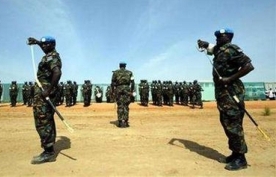UN must send more troops to Darfur fast – commander
February 16, 2008 (EL-GENEINA) — The United Nations must deploy more troops quickly in west Sudan’s war-torn Darfur region, even without their full equipment, or risk losing Darfuris’ trust, a senior U.N. commander said on Saturday.

The most important first step for the U.N.-funded peacekeeping mission is to give displaced Darfuris confidence that the troops will protect them, said Balla Keita, the U.N.-AU commander of West Darfur, the most volatile part of the region.
Darfur has been racked by violence since a rebellion broke out in 2003. International experts estimate 200,000 have died and 2.5 million been driven from their homes in five years of violence. Khartoum accuses the West of exaggerating the conflict and puts the death toll at 9,000.
The new mission was set up after months of argument with the Sudanese government, which has said a majority of contingents must be African and rejected several other contributors.
“If everybody is waiting to be fully equipped according to U.N. standards it’s going to take too long,” Keita, a Senegalese, told Reuters.
“The countries in the U.N. need to be more flexible on standards and just focus on sending troops to reinforce what is on the ground so we can … deliver something that the Darfuri people can see,” he added.
Senegal, which has pledged a further battalion to the Darfur force, needs Armoured Personnel Carriers (APCs) from South Africa which will take six months to arrive, he said.
The shortage of troops in el-Geneina, the capital of West Darfur state, means the soldiers work every day often on both day and night patrols, he said.
SERIOUS TROOP SHORTAGE
The new force, known as UNAMID, took over from a struggling African Union force, called AMIS, on Dec. 31 but has only 9,000 of the 26,000 police and troops needed.
The AU troops were rejected and even attacked by frustrated Darfuris who felt they could not protect them from attacks by Janjaweed militias. The rebels have split into rival factions.
“In 2-3 months if we don’t change the situation, maybe we will start seeing these people just having the same perception they have had with AMIS and I think it’s not good,” the Senegalese commander said.
Keita commands one of three sectors in Darfur and his, bordering Chad in the throes of its own insurgency, is the most complex.
In less then two months on the ground he has met all those involved — government, rebels and Arab tribal leaders — and is touring all the camps for displaced Darfuris in his area to give out his phone number as a confidence-building measure.
“All of them have my personal number,” he said, adding that the number of calls and his lack of Arabic had forced him to pass the number to a duty officer, on call 24 hours a day to answer calls for help.
He has also increased patrols, initiated frequent night runs, restarted a policy of troops accompanying women leaving camps to get firewood, and placed daytime armed teams in the camps to win the confidence of displaced people in the first few months of the mission.
These are stop-gap measures until his troops can deploy at full strength, he said.
“I know that it’s very difficult to get everybody here but let’s do our best to get 3-4 battalions so we can do more and they will believe more in UNAMID,” he said. “The initial reputation of the mission — that is the main challenge.”
Keita said his long-term goals were to protect Darfuris and to persuade the West Darfur factions to sit down and talk to each other.
“I’m hopeful that maybe if we cannot reach the global negotiations, then if within the sector I can make people talk to each other, that would be wonderful for me.”
(Reuters)
